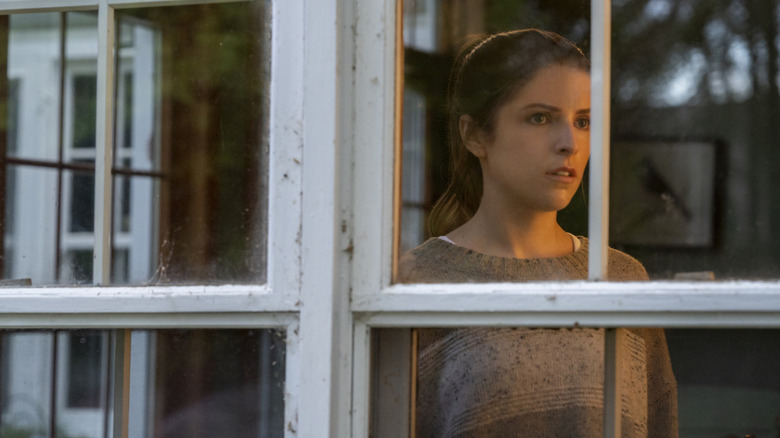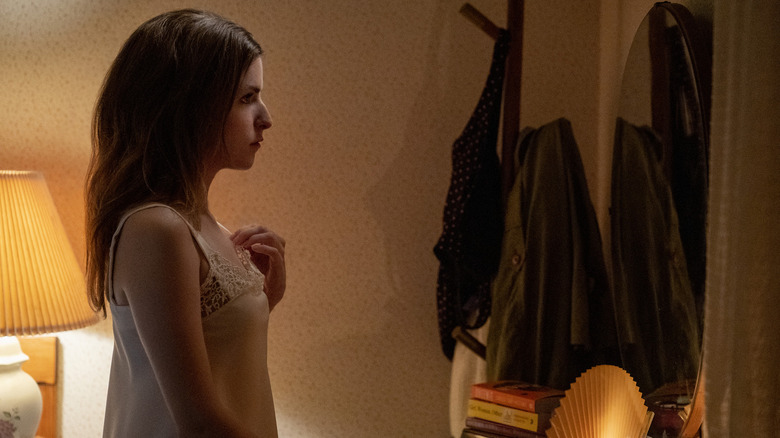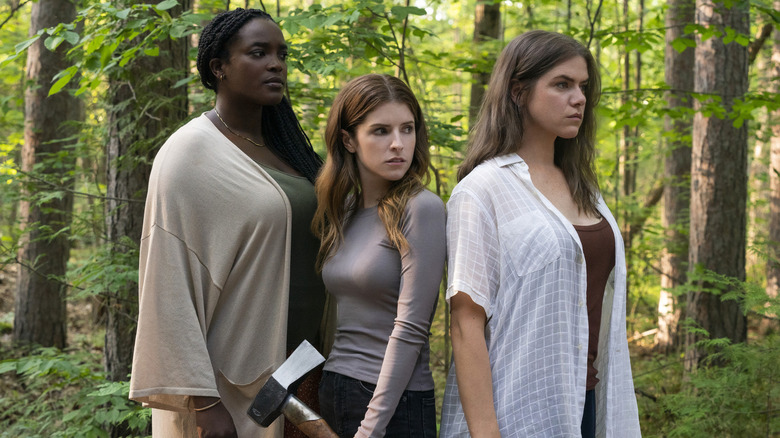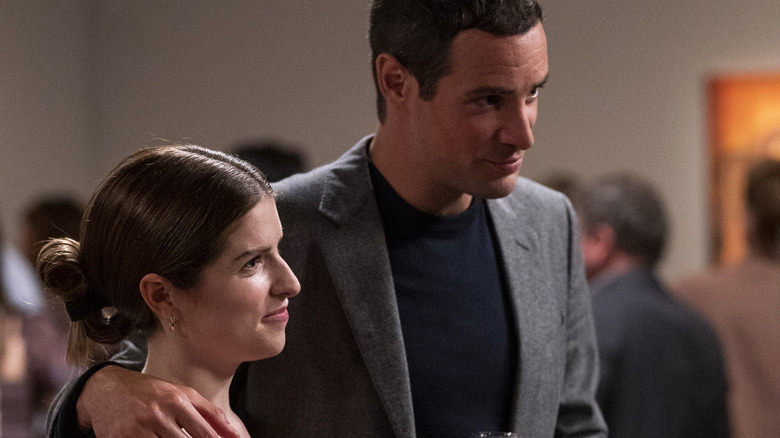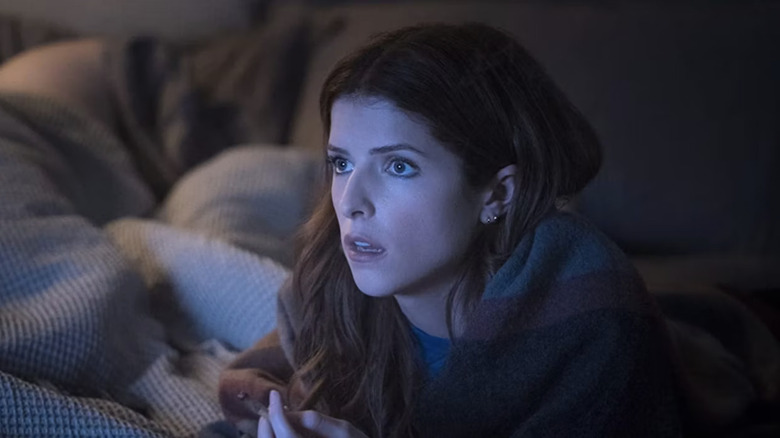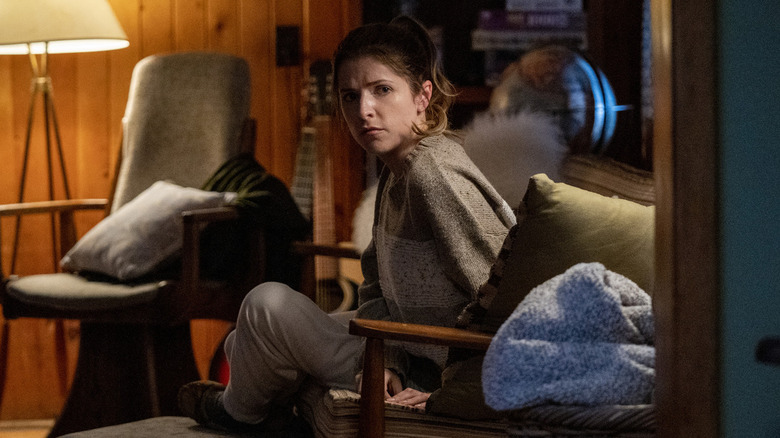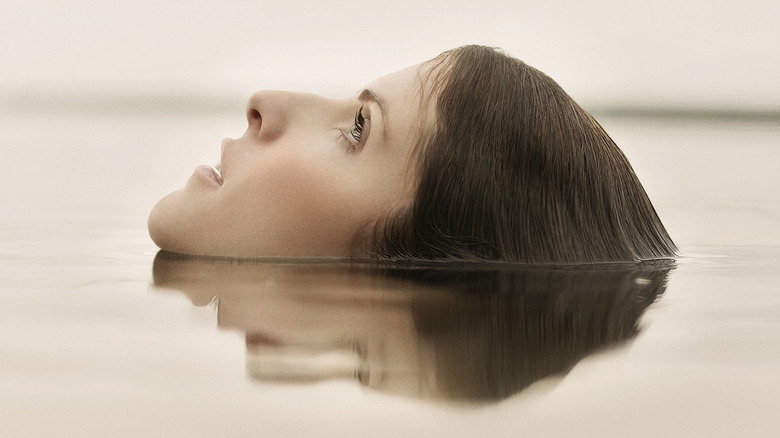Alice, Darling Director Details The Film's Deftly Handled Tension [Interview]
Often, films that cover domestic abuse will solely show the brutality of the situation without diving into the psychological and emotional aspects at play. Seldom are scripts bold enough to ask and answer the question: Why does she stay? In these fictional depictions, the decision to leave a romantic partner who treats their significant other poorly seems like the most obvious choice in the world. Gone is the nail-biting and second-guessing mentality that comes with years of being told you're wrong, you're ungrateful.
No, we don't see suggestive smirks, positive interactions, or glimmers of flirtation between the abused and abuser that blur the lines between affection and controlling tactics. The men are bad news, and this spectacle-like take on domestic abuse disempowers the women characters in these relationships, chalking their situation up to poor judgment calls. Anyone who has experienced intimate partner abuse knows things don't start at level 11 — there are incremental degrees of manipulation, control, and violence that anyone can become entangled in within an unhealthy relationship. No one wants to love someone who consistently hurts them, but sometimes the people we love do hurt us — even if it doesn't begin that way and we hope things can return to how they were. It's a lot to process.
In "Alice, Darling," director Mary Nighy details the delicate layers of leaving an abusive romantic relationship. The tense drama follows Alice's (Anna Kendrick) journey to reclaim herself. I had the delight to speak with Nighy about the film's deftly handled material.
This interview has been edited for length and clarity.
I do like dwelling in the awkward
When I saw that you directed an episode of "Industry" previously, it made such sense to me. In a lot of ways, it reminds me of "Alice, Darling." They're both projects that are super tense. But they rely on a lot of close-ups of characters and watching how other people react. They don't have as much dialogue as other shows or films, and they let the characters be with themselves. I would love to hear if any of these aspects of this script drew you to the film, or if you see any similarities between these works.
Oh, that's really interesting, Cass. Great insight. I'm glad that you saw it.
Yes. With "Industry" and with "Alice, Darling," you're right, there's a very high amount of tension. It's funny because my agent over here was saying to me the other day that she thinks I'm really good at making people uncomfortable with my work. I am interested in that. I do like dwelling in the awkward. When things don't go smoothly — I suppose on some level all drama is conflict — but I guess I do like those socially difficult, awkward moments. I'm also really drawn to the unspoken. I'm a big novel reader and I love trying to externalize what's happening internally in characters.
We definitely had the opportunity to do that with "Industry" and they were very open — everybody involved, the showrunners, the network — to us using filmmaking techniques that might not be in traditional TV and allowing characters to breathe. Part of what interests me is getting inside the character's heads and not necessarily loads of plots. I'd say that "Industry" probably is certainly more plot-driven than "Alice, Darling," But both, as you say, allow a lot of time with characters and have a bit of spectacle in them. I was really happy that in my episode of "Industry," I was able to shoot a party. I was able to shoot some great exteriors out in London. There's a sort of glamour to that. You get a little bit of that with "Alice, Darling," with the gallery scene and with the fireworks.
Sometimes music tells you what you're supposed to be feeling
Building off that idea of the unspoken. I know in literary circles sometimes they say the "pregnant pause" and there are plenty of those moments in the film. I was curious how that affected your connection to the score and soundtrack of the film. Were you super involved within that process? I feel like there are such moments of stillness without sound, and then there are moments where there are those musical swells that add to the empathy that we feel for Anna Kendrick's character Alice. So I would love to hear what that process was like.
Well, so that's again a great question, Cass. The score, but also the sound design, was really key when we were thinking about, "How do you get inside Alice's head?" A lot of the sound design is trying to replicate what's happening to her. So for example, at the opening of the film, you've got the phone that's pinging all the time, and the bar is quite hectic in terms of all the different soundtracks. When you go when she's alone and taking that selfie in the bathroom, it all dribbles away and it's just the thump of the bass from above.
I worked with Owen Pallett on the score itself, and he's a brilliant composer. He composed the score for Arcade Fire's "Her." What I loved about working with Owen is that he had this very strong idea, which he presented to me when he pitched on the film — of using strings and kind of plucking sounds — which he get very much in the opening title sequence of the film to create tension. That really evolves over the course of the film and it becomes much sweeter and warmer as the friends are coming together.
It's interesting, if you look at where a score falls in the film, there's a lot more in the first two-thirds. What's interesting is that when Simon [Charlie Carrick] turns up at the house and the film becomes most tense, almost all score drops away [...] there used to be score under his arrival as well. Owen created a beautiful piece and we recorded it with an orchestra and everything. But then I suddenly said in the mix, "Do you know what? I don't think we need that. I don't think we need the music." To Owen's credit, he listened to it with me in the mix. He put all this work into creating that piece. And he said, "No, you're quite right. It's much more tense and more interesting without it." Sometimes music tells you what you're supposed to be feeling.
It was similar with the hair pulls, we had to build it
Right.
We found that when we pulled it out, it really worked without music. The score just comes back for that very end moment when Alice is going underwater. We wanted the music there. I think had we used a much more sinister, foreboding kind of music there, people often read that scene of her going underwater quite differently. Some people think she's killing herself. Some people see it as a rebirth [...] We put a pause in just as she sinks in the water in the score and musically it didn't really work. He kept saying, "The score ought to come back in. This is ruining my boss!" — the sequence here in terms of what you are supposed to do musically. I said to him, "I know, I know, but please prolong that pause for as long as possible because then the audience might doubt whether she's going to come up again." And then there is a surge of music as she surfaces. We were trying to be minimal with the score and really thoughtful about where it went in.
My favorite character detail — which I think carefully escalates in the film — is Alice's hair twirling. It starts from the opening scene as things start to ... bubble up to the surface, so to speak. We see that coping intensify and it's such a small but disarming thing. Was that something that was always in the script? Or was that something that on set when you were working with Kendrick, it evolved as a way to put some physicality in her trauma?
No, the hair-pulling was always in the script. It was something that [screenwriter] Alanna Francis put into the script. I found it really fascinating because you can interpret it many different ways, what's happening. Alanna and I developed two techniques with the hair/makeup team for hair pulls. One was a piece of hair attached to the nape of her neck, which would be the sort of stronger finger yank. You see in the initial scene when she's in the car, you see her twirling, but you don't actually see a pull. Although we did shoot a pull there where hair actually comes out. In the script, it said you were supposed to see in that opening car scene: Alice pulls out a piece of hair and rubs it between her fingers.
More on the hair pulling
Oh, that's fascinating.
What we found in the edit was it's too much of a reveal. A bit like what I was just describing to someone else about charting her understanding of what's happening to her within flashes and having to be quite gradual in how you build that awareness for Alice of what her situation is. It was similar with the hair pulls, we had to build it.
What we decided was the real crescendo was going to be following her confrontation with Tess [Kaniehtiio Horn]. Once she's fallen in the water, you would see a different kind of hair pull, which is coming from the top of the head. What the hair and makeup team did was they put strands of hair in amongst Anna's wet hair and she would pull from the top rather from underneath. I think that one is the one that really, when I've watched it with audiences, I've heard them audibly react because the sound is very important there and what the sound team did in terms of that yank.
I think you've seen glimpses of her hair-pulling. You've seen the redness at the base of her neck when she's in the bath and when she's twisting the hair in her finger in the bedroom, to give you a sense of the consequences of and how habitual that behavior is. But then when she gets into that later bathroom scene, it really reaches this kind of fever pitch and you see a much more graphic version. We really pulled back in the later scenes on not showing it at all. There is one more time that it's shown just when Simon's wanting to sleep with her at the cottage and she goes into the bathroom and does a hair pull there. But we shot a lot more. But we decided to pull that back there as well.
We wanted to show what Simon did to her and how she becomes reduced when he's there.
What I really respect about this film is that it does feel — restrained isn't quite the right word — but it does feel like there are some set rules that you and your team have made for the film so that you're depicting a survivor of an abusive relationship, but in a way where it's not like others that I've seen where all of a sudden the dials up at a level 11 — sometimes that just seems insulting to the characters involved. I would love to hear if there were any aspects of this — whether how much Kendrick gets to emote outside of herself or how sinister Simon should be played — that you set up to keep that steady crescendo feel. The tension in the film is so delicate.
Oh, well thank you for saying that. We were really driven by the idea of trying to take the audience with Alice, and for them to have insight really throughout. Our fear was that, as you were describing, dial it up to 11 where it's not, and the audience can't follow that the whole film would lose meaning because you would lose that insight.
What we did on set was in terms of Charlie Carrick, who played Simon, he and I had many conversations about how we had to really play against what was written almost and humanize that character there so that he was three-dimensional. But also so that it was believable that Alice would stay in that relationship and want to be with him. So that our understanding as an audience is more gradual about what's going on between him and Alice.
I think one thing that happened both with Anna before we got to set, but then also happened in the edit with the editor Gareth C. Scales and I, was that we eliminated a lot of Alice's dialogue. What we decided as a kind of rule in the edit was that whenever Simon is around, Alice becomes kind of mute so that you get the sense that she really transforms when she's in the cottage with the friends. So when she's in Toronto, we cut quite a lot of her dialogue, and even more so when Simon comes up to the cottage. For example, in the bedroom scene where he tells her, "You're so incredibly selfish" and says, "You're not exactly living in the lap of luxury." To all of those lines, there was a response. Anna delivered those responses beautifully. But we decided to cut them because we thought it was very powerful — this idea that he silences her literally. And you've seen her having fun with her friends. You've seen her out and about. You've seen her singing drunk on the street. You know that she can be a very vivacious, alive character. But we wanted to show what Simon did to her and how she becomes reduced when he's there.
'I do like dramas that lean towards genre, that aren't genre'
In the bar scene, I saw tattoos on one of the characters' forearms. Did they all have this tattoo as like a shared history moment?
Do you know what Cass, I wish that I'd had that thought because that's a brilliant thought. But that's actually all [Kaniehtiio] Horn's actual tattoos, they're all on her.
Oh!
They're her real tattoos. It was important to her that those be shown. I think that was more of a rendering of Tess' character — her being a little bit more of an outlier, a bit of an outsider, an outlaw. Sophie [Wunmi Mosaku] has a salaried job with an NGO. Alice has a salaried job in an administrative role within a big corporation, sales. But Tess is the artist. What we were trying to do with Tess' tattoos and also with her costume design is feel that she's a bit more out on a limb and doesn't have her life, as Sophie kind of implies, doesn't have her life quite on the same track. We all collectively thought that Tess was probably a very good artist, probably working in a medium that's quite hard to sell like video art. That plays into the tension with Simon and also the tension with Alice, where Alice is able to tell her that she's not a real grownup because she doesn't have a salaried job in the way Sophie and Alice do.
After this project, what are you going to take from this work into your next film? Whether it's the genre of films you want to tackle next or the kinds of stories you want to tell, what would be your ideal next project to work on after this one?
I have got a script that I'm ready to shoot — more or less. I think what I'm realizing about what interests me as a director is I'm obviously very drawn to in-depth psychology and working with actors and crafting performances. I think because of my background, it's hopefully one of my strengths. But also I do like dramas that lean towards genre, that aren't genre. I feel that "Alice, Darling" is sometimes described as a thriller. I feel like it's a drama with thriller elements. My next project, or what I'm hoping will be my next project, is again, more or less a drama. But it has genre elements that take it beyond kind of kitchen sink realism into something a little bit heightened. I think that playing with genre is something I'm excited to explore and building on the work of really trying to create three-dimensional characters and working with great actors. That's the dream.
"Alice, Darling" will be playing exclusively in AMC Theaters starting January 20, 2023.
If you or someone you know is dealing with domestic abuse, you can call the National Domestic Violence Hotline at 1−800−799−7233. You can also find more information, resources, and support at their website.
